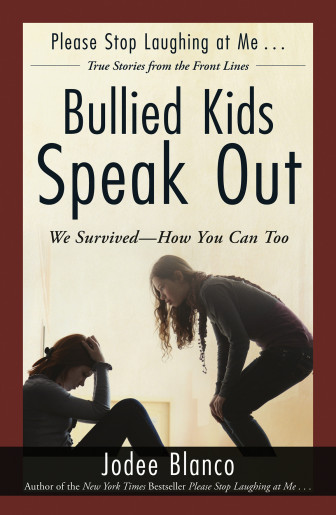 Bullied Kids Speak Out: We Survived—How You Can Too
Bullied Kids Speak Out: We Survived—How You Can Too
Jodee Blanco
AdamsMedia, 2015
206 pages
“When I was in school, I never thought it would get better. I can still hear my classmates laughing at me. I can still feel the sting of all those parties I never got invited to, the football games on Friday nights I longed to attend but didn’t dare because I knew I’d be sitting alone in the bleachers, humiliated and ashamed. Don’t even get me started about what it was like in the cafeteria at lunch or in the locker room after gym class.” In the introduction to “Bullied Kids Speak Out: We Survived—How You Can Too,” Jodee Blanco, the book’s author, uses these words to describe the long-lasting impact of being bullied, harassed and pushed around by the mean kids at school. What irks Blanco the most about bullying, and led to her becoming an activist who has written four books on this subject and regularly speaks to teens and school boards, is the behavior of students and teachers who witness the bullying but don’t do much to stop it or come to the victim’s defense. Blanco asserts that “bullying isn’t just the mean things you do but all the nice things you don’t do.”
In “Bullied Kids Speak Out: We Survived—How You Can Too,” Blanco presents the experiences of 17 teens in their own words — in some cases the descriptions of verbal and physical abuse are explicit and told in graphic detail not to offend or shock but to allow the reader to understand the depth of pain and betrayal felt by these victims. The uniqueness of this book is its focus on how these 17 teens overcame the bullying incidents to turn “lemons into lemonade,” and to make a difference in their schools and communities. In some cases the lives of other bullied teens were improved too. For each teen, Blanco writes an uplifting message about how the teen dealt with his or her situation; however she is not afraid to point out to these teens that some actions, such as when Zach locked himself in his room and Tiffany got drunk at a beach party, were detrimental or dangerous.
The actions of these resilient teens are remarkable. For instance, there is Taylor, a cool girl in school, who befriended a not so cool girl, and for this kind act she was kicked off the cheerleading squad. Taylor started an anti-bullying club and revised her school’s anti-bullying policies. There is Aamina, a Muslim teen, who was liked by everyone. Her parents owned a popular restaurant in the community. Aamina’s life spiraled down, and her parents’ restaurant almost went bankrupt as a result of a growing prejudice in the community against Muslims. Aamina and her mother started a chapter of a Muslim Mother-Daughter Club in their town. Because Aaron is gifted, he has been picked on since kindergarten. The bullying eventually got so bad that Aaron in high school stopped going to class and doing homework, and began getting Cs and Ds that made it difficult to get accepted to the kind of college his parents wanted him to attend. Finally, at his parents’ suggestion, he wrote a letter to his first choice college explaining why his grades in the latter part of high school were so low. Fortunately, things worked out for Aaron, but Blanco’s advice to teachers is not to single out teens as “examples of excellence,” which may open them up to the mean taunts of teens. Instead, save the kind words for a one-on-one talk.
Blanco’s message to teens is to never give up in the face of bullying! If you are bullied, do something about it — don’t back down and act the victim because there is nothing wrong with you! The 17 true-life accounts presented in this book are clear evidence that not backing down has great dividends. She writes, “They never gave up. Some took longer than others, and some made a lot of mistakes before getting it right, but every one of them found a way to stand up to their bullies and reclaim their lives.” Blanco’s second message is for educators and youth workers who may not know what to do, so they choose to do nothing instead. Blanco suggests anti-bullying policies be in place and followed and that expectations for the ways teens treat each other become frequent topics of conversation.
Blanco survived her own bullying during high school to author four books on the topic, including the New York Times best-seller “Please Stop Laughing at Me…” She travels to schools, sharing stories about overcoming bullying. This is a book whose message needs to be heard over and over again.
Additional resources about bullying:
More information about Jodee Blanco’s effort to vanquish bullying are available at jodeeblanco.com, where Blanco presents programs for teens and administrators.
The National Youth Violence Prevention Resources Center at Fact for Teens: Bullying.
The Centers for Disease Control and Prevention provides lots of information about youth violence and bullying utilizing federal statistics and numbers at cdc.gov/violenceprevention/youthviolence/.

























